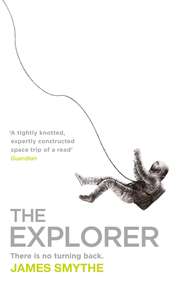По всем вопросам обращайтесь на: info@litportal.ru
(©) 2003-2024.
✖
The Echo
Автор
Год написания книги
2019
Настройки чтения
Размер шрифта
Высота строк
Поля
‘I would have thought it enough to not let her up here.’ I can trace each ping from here, and watch them: little orange dotted lines, pushing out like digital ticker-tape. They disappear, and another part of the anomaly is confirmed: an area of space that we cannot see, that barely exists. ‘But you made the call.’
‘Yes,’ he says. ‘She was the best person for the job. I don’t mind there being something wrong with you if you’re the best person for that particular job. I honestly never thought that it would be a problem, Mira.’ He is silent. I imagine him leaning over his computer, bent towards the screen, examining the visualization of this. Watching the pings that I watched fifteen seconds before, as the data reaches him. ‘You’ll have to deal with it.’
‘It’s fine,’ I say. ‘Is there anything else I need to know about any of the others?’
‘Nothing,’ he says. ‘Would it matter if there was?’
‘What if she had died?’ I ask. An orange line flies past the anomaly and carries on into the distance: traced away, so small that I will never see it. The result of what it finds will return to us when it does: eventually it will stop. Maybe it will stop so far away that we will no longer even be receiving data when it sends itself back. That we, humanity, will no longer even be alive.
‘Well, she didn’t,’ Tomas says. ‘She is fine. Bruised and embarrassed, but she’s fine.’
‘Okay,’ I say. I spin the anomaly again. We have no way of knowing how deep it is, because we have to imagine that it is a wall, and there is no way of seeing what’s behind it. ‘Does it scare you?’ I ask. ‘This anomaly? Whatever it is.’ I wait for a reply, but one doesn’t come. ‘Are you there?’ I ask, but nobody answers, not even Simpson; which means that Tomas is still sitting at his desk, still at the computer, but he’s simply choosing to stay quiet.
I stay and watch the lines. This is such a process: like tracing the outline of a planet with the ends of strings of thread. Tomas and I wrote an algorithm to plot the pinging of this thing. The intention was, it would find likely areas and match them, following lines and trying to extrapolate the size of it that much faster. There is a game you play when you are children, Battleship: you pick a place that your opponent might have placed their ship, a number on a grid that you cannot see, and you hope that you will somehow pick the right space. If you do, you extrapolate the rest of the ship based on that: moving up or down or left or right, assuming the likely choice that they have made, hoping for another hit and to sink their ship. We played it a lot, Tomas and I. It was the perfect way for us to test how much we thought alike: how much we had to work to outfox the other. I imagine him, watching these with me, or slightly delayed; or maybe not. Maybe gone from the lab, finally heading home to his baker, to spend time with her. Forgetting about me, about this, about us, for an evening. Thinking of this as work, not what it actually is.
I switch the screens off. I don’t need to watch this. If he is still with me, so be it. I detach myself and push off, and I struggle at the ceiling, but then I push myself through to the corridor, and then down to the living quarters. The ship is quiet. Four of the bed lids are down and darkened, and only Tobi is still awake. I drag myself through, trying to make as little noise as possible, and she turns her head to watch me gracelessly approach. I settle in the seat next to her and clip myself in. She yawns and nods at me. I feel secure for a second. It’s nice, after the chaos of floating, to have this security. She is confident, and taking back control.
‘How long do you reckon we’ve been up here now?’ she asks. She puts her hand over the clock on the screen and looks at me. ‘No cheating, take a guess,’ she says.
‘What?’
‘See if you can guess. I couldn’t. I can’t tell if it’s only been a day, or if it’s longer. Everything becomes loose here, you know? Without the sunrise, without the sunset. Without defined bedtimes. And I feel tired all the time, whatever I’m doing. And that’s not my eye or whatever. Even just sitting here, that feels tiring.’ She turns back and looks at the screen, focusing on the expanse of nothing that’s in front of us. The view that offers precious little sensation that we’re even moving, so large is space and so small are we. She reveals the clock.
‘We should try to think of it in terms of hours here, hour to hour, rather than concentrating on the days. Back home, that’s where they need days,’ I say to her.
‘Yeah, maybe. Maybe.’ She yawns again. ‘But everything is looser. Time, speed, place. Everything. If you focus on a star you can see it move, if you stare at it. Or, you know, you can see us moving.’ I do as she says. I pick one – Algol, in Perseus – and I stare at it. I plot where it is in relation to the rest, and to the console and the frame of the window, and then I keep staring. Over time, and I have no idea how long that time is, it shifts, or we do. Such an infinitesimally small amount, barely perceptible. Barely registering. ‘It’s humbling, I think,’ Tobi says. ‘But at least we’re definitely moving.’
‘You walked away from two crashes,’ I say.
‘I did.’
‘Were you scared? How did you do it?’
‘What do you mean?’ she asks.
‘You were scared, with your eye,’ I say. She reaches up and touches it. ‘But back then.’
‘Well, now. See, I couldn’t do anything about the eye. If something had gone inside me, that’s not a thing I alter myself. If I was dying, not like I could change that. If I was dying then, that was it. Boom, dead.’ She rubs it, as if she can feel the wound. ‘With the crashes, that was in my own hands. All I could do was try to save myself.’
I stay sitting next to her. Neither of us talks after that.
Wallace, when he wakes up, asks me to go to the engines with him. He is proud of them. They are one of the few parts of the Lära that we avoided directly working on, once we had told him our brief. We helped him assemble his team and they designed them. There were stipulations – cost, consumption, having to work alongside the piezoelectric life-support systems – but they had carte blanche after that. He shows me them, because he wants my approval. He wants me to see how impressive they are, and how well they have worked. He waits by them, and he runs diagnostics. Now, they’re doing nothing: our plan is that we will not stop until we reach the anomaly, and we’re coasting off the momentum that we established with the initial acceleration. The boosters stop us accelerating any more – or, at least, stop us moving out of our allotted safety zone of acceleration – so, for the most part, the engines spin quietly. They are ready to stop us, when needed, but now he can run checks and tests, and, as he tells me, try to optimize them out here, to do real-world work on them that was impossible back on Earth.
‘It’s good,’ I tell him. ‘You do what you want to, okay? I trust you on this.’
‘Excellent,’ he says. ‘Appreciate it.’ But he doesn’t look away, and he doesn’t ready himself with work. ‘Look, I have a favour to ask,’ he says. ‘I’m missing my girls.’
‘Okay,’ I say.
‘Would it be all right if I called them?’ He has a wife and two daughters. They live in a house in Orlando. His wife is a teacher and his daughters are both at the school she now works at. I try to remember any other facts from his file. ‘It’s Karly’s birthday tomorrow. On the eighteenth. I just wanted to give her a call, say hello to them all.’
‘I, uh. Listen,’ I say. We have rules. They are allowed to pass on messages or have messages passed by Tomas or the ground crew, because that’s the only approval for bandwidth we have. He knows that. I don’t want to have to say it.
‘No, sure, it’s okay.’ He is saving me from having to. He is lost, for a second, not making eye contact with me. ‘I know, you let me, you’ll have to let them.’
‘You know how it is,’ I say. I cannot stand this. I cannot abide this conversation: not just the favour he’s asked, but the very being part of it. I want out. ‘I have to get back and check on the others,’ I say, and he nods, so I go. I move down the corridor and I leave him there by himself.
‘Problem?’ Tomas asks. He has been listening in. I want to tell him to stop, but we designed the system so that he could; so that, were it me down there, I could, if I wanted to. Complete mission parity. Completely open.
‘No,’ I say. ‘He’s lonely.’
‘Aren’t we all,’ Tomas says. I picture him with his baker. I do not say what I am thinking.
I want to sleep, but I cannot. I lie there and I think about what this means, and the pressure. There is always something coming, here. I have to be at my best, and that is my worry: if I do not sleep, I will function at some percentage of my absolute ability, and I could ruin everything. I get out of bed, and nobody is looking, and I contemplate staying awake; but there is another option. In the medical cupboard, the hypos with the sedative. We have so many shots, delivered in tiny liquid capsules which are then injected into the neck before dissolving; and they are harmless, non-addictive. Before, Inna administered them, but, I reason, how hard can it be? I am not scared of needles. Needles are a necessary evil. I load one into the hypo and try to find the spot she pushed it into my neck before, where there is still a pock-mark on the skin; and I hold the injector there and push the button. When I have done the first I make a choice: to take another, straight away. Two to settle me, to ensure that I am down. I inject it into the same spot; this one stings a little more. I get back to my bed and I begin to count, and I am gone. This works. This has really worked, and I can sleep, and be safe.
‘Wake up, Brother,’ Tomas says. ‘We’ve found something you’re going to want to see.’ He opens the bed for me, and I’m alone in the sleeping area. ‘Come to the lab,’ he says, which means it’s something related to the anomaly. He was meant to wake me first, before anything was announced, before any decisions were made. We were both meant to be there at the start of these things.
I have an erection, so I dress myself, pulling on the thick trousers designed to regulate our temperatures, and I desperately need to piss but that can wait, because I’ve obviously already missed something that he thinks is important. Down the corridor, all their voices coo as I float down, clinging to the bars. I think of myself as a trainee ballerina. Pointe. Demi something. Stupid. I should have been here.
I wonder if Tomas has done this on purpose.
One of the screens has been extended to fill the length of the wall, and they’re all peering at it. It looks like nothing at first; as if it’s been switched off. But then Inna turns to me, and smiles. She holds her hand out to usher me to the front.
‘Isn’t it beautiful?’ she asks. I peer at it, and then I see it.
It’s the anomaly. I can’t tell the scale, so I shift the screen to a more scientific view – and they groan as the grid pulls itself over the image, a scientific sheen over this thing of natural beauty, but then I can see how far away it is, and still how large, even at this immense distance – and then I see the edges of it. It’s like a sheet of something that sits in the middle of the nothing: a pulled, taut sheet, where the corners and edges ripple like waves. And the texture – admittedly we’re far out, and this resolution, as much as we can see, isn’t going to be entirely trustworthy – but it’s like oil, somehow. It’s black, but not like the colour of space. Space isn’t true black. When you look at it, sure, that’s what it seems. But when you examine it, it’s got colour and light bouncing around inside it. It’s lit, and the blackness you can see is just a temporary absence of light. This is a different sort of black, painted or created, but I’ve never seen anything darker. I’ve never seen anything this pure before.
‘This is from the bounce?’ I ask. We have a chain of satellites between us and the anomaly. Tomas and I spent a year setting them up, sending them out and getting them roughly where we wanted them to be. They bounce visual data, downscaling it at each choke-point. The bounce is how I can talk to Tomas from here; and now we are finally close enough to see this in a resolution that lets us make out details.
‘It is,’ Tomas says. ‘We are finally close enough.’ Any chance of this being as incredible as I know it is – because it’s never been seen on a live feed, not like this; and that fact alone essentially means it’s never been truly seen full stop, as that’s how humans work – is diminished by seeing this last. It is, to me, like being told the ending at the start of the story.
‘We couldn’t sit on our hands while you slept,’ Tomas replies. I wonder how this reads to the rest of the crew. How antagonistic they think he is, or I am.
‘No,’ I say, but I can taste the lie in my own mouth, and feel myself brimming with anger. ‘Of course not. You were right to continue.’
‘We woke you up as soon as we were close enough to see this thing, and when we had processed the picture properly. We had to be sure.’ Of course you were sure. Of course you waited. I call up the readings from the ping, try to compare it to the pictures we have received from the satellites. The ping is working, giving us something resembling an edge, numbers, an outline. I examine the readings concerning the scale of it, the approximations of how large it is. I check the numbers against what’s in my head, and then call up the old measurements – Dr Singer’s best guesses, the estimates that he worked on his entire life. They are wrong, and I can tell that. It’s obvious to anybody even glancing at a comparison. While it’s possible that Dr Singer was wrong, it’s unlikely. ‘The scale of this thing,’ I say. ‘Were we off?’
‘It’s definitely larger,’ Tomas says. ‘It’s grown.’
‘Or it’s closer.’
‘Either way it’s closer, surely? Whether it has physically grown or hasn’t.’ He is explaining the basics of physics to me. I am grateful that he cannot see me.
‘How far away are we?’ I ask. I can hear the shake in my own voice.
‘Ten days,’ Tobi says. ‘Somewhere between ten and eleven. We’ll have an exact number of hours soon.’
‘That close?’










